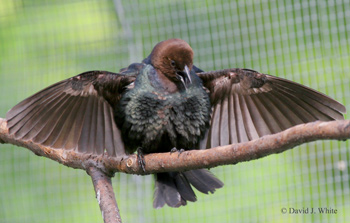 The White Laboratory of Animal Behavior
The White Laboratory of Animal Behavior
Social Learning, Social Development, and Social Evolution

Animals of many species depend on social interactions throughout their lifetimes to learn critical aspects of their behavioral repertoire. Yet many facets of the product and process of social development have gone understudied.
Research in my lab centers on building a new model of social learning, development and evolution, focusing on how the social environment can structure, organize and control behavioral processes.
Follow this link to Sam Hughes' cover story about the lab in the Pennsylvania Gazette: The Cowbird Variations
We take an ecological approach, focusing on the functional consequences of social behavior across different levels of analysis, including:
- investigating mechanisms of stimulus control
- manipulating development of reproductive behavior
- quantifying dynamics of large-scale social organization
- examining variation in traits associated with reproductive success
- studying transmission of culturally established behavior patterns across generations.
This research program has revealed rules that govern animals' responses to the social environment; rules that can differ by sex, age, and motivational status. When animals are allowed to interact in freely associating groups, these rules produce patterns of organization that cannot be understood as properties of single individuals but are nevertheless critical for developing adaptive behavior. For example, we have shown that social factors can modify mating preferences, affect the structure of communicative signals, affect the development of courtship competence, and impact sexual selection.
Keywords:
Animal behavior, social development, social learning, communication, cultural transmission, mate choice, sexual selection, behavioral ecology, evolution
Last updated: Jan 26, 2006